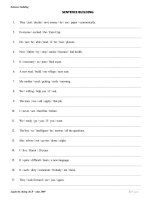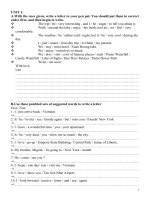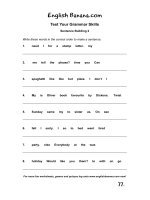SENTENCE BUILDING SEQUENCES OFTENSES
Bạn đang xem bản rút gọn của tài liệu. Xem và tải ngay bản đầy đủ của tài liệu tại đây (86.05 KB, 2 trang )
<span class='text_page_counter'>(1)</span><div class='page_container' data-page=1>
<b>Sentence Building - Part 4 - SEQUENCES OF TENSES</b>
Sự phối hợp các thì trong câu. Mối quan hệ thì của động từ trong mệnh đề chính và
mệnh đề phụ.
<b>IV. SEQUENCES OF TENSES</b>
<i><b>A. Main verb in the Simple Present</b></i>
<b>If the main clause is</b> <b>then the dependent clause can be</b>
Simple Present
(1) Present Progressive
(2) will, can, or may + verb
(3) Simple Past
(4) Present Perfect
(1) I <b>see</b> that Harriet <b>is writing</b> her composition.
Do you know who <b>is riding</b> the bicycle?
(2) He says that he <b>will look</b> for a job next week.
<b>I know</b> that she <b>is going to win</b> that prize.
Mary <b>says</b> that she <b>can play</b> the piano.
(3) I <b>hope</b> he <b>arrived</b> safely.
They <b>think</b> he <b>was</b> here last night.
(4) He <b>tells</b> us that he <b>has been</b> to the mountains before.
We <b>know</b> that you <b>have spoken</b> with Mike about the party.
<i><b>B. Main verb in the simple past</b></i>
<b> If the main clause is</b> <b> then the dependent clause can<sub>be</sub></b>
Simple Past (1) Past Progressive or Simple Past (2) would, could, or might + verb
(3) Past Perfect
(1) I <b>gave</b> the package to my sister when she <b>visited</b> us last week.
Mike <b>visited </b>the Prado Art Museum while he <b>was studying</b> in Madrid.
(2) He <b>said</b> that he <b>would look</b> for a job next week.
Mary <b>said </b>that she <b>could play</b> piano.
(3) I <b>hoped</b> he <b>had arrived</b> safely.
They <b>thought</b> he <b>had been</b> here last night.
<sub></sub>
EXAMPLE</div>
<span class='text_page_counter'>(2)</span><div class='page_container' data-page=2>
sentences.
Astronomers / predict / sun / die / about ten billion / year.
<sub></sub>
Though we / have / very difficult examination / last night, / I /
do / very well
</div>
<!--links-->









